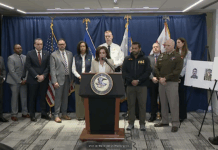
(GA Recorder) – After hearing reports of people standing in line for hours after early voting opened in last June’s primary election, Atlanta resident Holly Frew decided to pitch in to make the wait outside a Fulton County precinct more bearable.
She and a friend teamed up to hand out snacks and cold water to voters waiting at the College Park Library branch, where the line of voters snaked far from the entrance. The voters she met were grateful for the refreshments after standing in long lines.
“Oh, they had been waiting hours,” Frew said last week. “I mean, some of them had been there since that morning. They had been there over four hours.”
Under House Bill 531, the controversial expansive voting restriction bill that passed the state House along party lines last week, what Frew did would be illegal.
The bill proposes to limit early voting and require identification to vote absentee, and also bans so-called line warming, offering gifts, “including, but not limited to, food and drink” to a voter within 150 feet of a poll.
“We don’t ban anyone from receiving food and drink; there’s just a limit of how close they can get to the polls to do that,” said the bill’s sponsor, Republican Rep. Barry Fleming of Harlem. “Once they get within about 150 foot of the polls, that’s when they’re there to vote, if you want to talk to them, interact with them, you’ve got to do it before you get to that area, so you can do all that as long as you’re not so close to the polls.”
The bill also bans giving any food or drink within 25 feet of a voter waiting in line. State law already prohibits giving money or gifts in an attempt to get someone to vote, register to vote or vote for a particular candidate.
Frew calls the bill a blatant attempt to suppress the vote, especially among minorities.
Long lines disproportionately affect areas in Georgia with large Black populations. According to an analysis by Georgia Public Broadcasting and Pro Publica, about two-thirds of the polling places that stayed open late for the June primary were in majority-Black neighborhoods, even though they made up only about one-third of the state’s polling places.
Frew gave out snacks to anyone who wanted one and did not ask anyone who they were voting for.
“I understand election law in terms of you cannot campaign within 150 feet, but there’s no campaigning involved in giving out the snacks and water,” she said. “It’s only just to provide them relief while they wait to vote and to help them make it an easier experience to vote. The only thing that we want to do, and that any organization that I’ve even seen or been involved with, wants to do when they’re passing out snacks and water, is to just make it easier to vote.”
Before January’s U.S. Senate runoff election, Secretary of State Brad Raffensperger sent a memo to county election officials reminding them to enforce the buffer zone around polling places, claiming that political groups use line warming as a pretense to influence voters at the last minute.
“The right to vote is sacred and fundamental to our democracy, and I am committed to upholding that right for all Georgians,” Raffensperger said. “Political organizations looking to game the system should be forewarned that we will not tolerate efforts to electioneer near polling sites in violation of the law.”
Fenika Miller, senior state coordinator of Black Voters Matter in Georgia, calls measures aimed at reducing line warming politically motivated.
“This bill is a direct attack on our partners across the state, who were actively engaged in line warming and passing out waters and snacks, just as a common courtesy to people, in addition to other organizations across the state who are doing the same thing,” she said.






